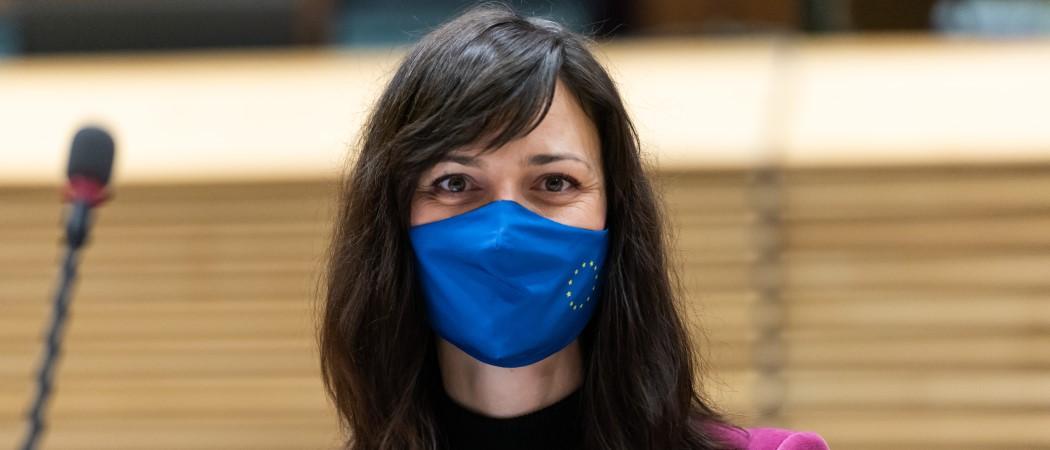EU research commissioner vows to avoid interruptions in the flow of EU R&D funding amid delayed rollout, as she outlines plan for stricter rules for international research cooperation, to reflect ‘geopolitical changes’

Mariya Gabriel, EU commissioner for research and innovation. Photo: EU Commission.
EU commissioner Mariya Gabriel kicked off the Science|Business conference on Monday with a promise that despite the late start to Horizon Europe there will be no interruption in EU research funding.
The first €120 million Horizon Europe call for collaborative research into emerging COVID-19 variants will launch in March, through an emergency procedure. “The gap between programmes will be very narrow,” said Gabriel, noting the last Horizon 2020 call closed as recently as January.
At the same time as the new R&D programme opens for business, the Commission will be drawing up tougher rules on research cooperation with non-EU countries, to reflect new geopolitical realities and ensure European values are protected.
The rollout of Horizon Europe was held up by late budget negotiations, which ended in December, only a few weeks before the start of the EU’s next seven-year budget. Parliament still has to approve the second part of Horizon Europe legislation and until then, the programme cannot launch fully. “Month by month, we are working with my team in order really to ensure that there will be no interruption,” Gabriel said.
In parallel with launching calls, Gabriel announced that the Commission is updating its approach to international cooperation in research and innovation, and will replace current rules introduced in 2012. “We need our international partners, but this time we need really to be sure that values and principles are not only simple words,” she said. “We have to ensure our values and our interests are protected. We must seek reciprocity and a level playing field.”
The first health research call may be launching in March, but the Horizon Europe strategic plan and work programmes will not be published until April.
However, the European Research Council (ERC), is not waiting for the rest of the programme to start, with the first call for projects due to open later this week. But ERC has cancelled its proof of concept and synergy grant calls in 2021 because of the late start to Horizon Europe.
Following on from the emergency COVID-19 call, with which the Commission aims to plug the gaps in pan-European surveillance of the genomics and epidemiology of the SARS-CoV-2 virus, the first eleven public-private partnerships in fields including batteries, artificial intelligence and photonics will launch in April, Gabriel confirmed.
The other 30-odd partnerships will have to wait until later in the year or the start of 2022, but member states have already pledged €10.8 billion, while industry has mobilised €12 billion for the research partnerships with the European Commission.
Gabriel said the Commission will put more flesh on the bones of the plans for the Horizon Europe missions in July, when it will announce which missions will move into the next phase. Then in the fourth quarter of the year, the Horizon Europe work programmes will be updated to include calls for the selected missions.
The Commission also hopes to establish an observatory on research careers, to collect data on researchers, their needs and job conditions, to inform policymaking.
European values and foreign interference
When it comes to tightening rules on allowing non-EU countries take part in Horizon Europe, Gabriel set out four principles for ensuring fair research cooperation:
-
The EU should support cooperation in areas where it is necessary and European values are “less at risk.”
-
Europe should limit cooperation on research projects involving sensitive technologies.
-
Academics and researchers should be better equipped to deal with foreign interference, with the Commission planning to publish guidelines in 2021.
-
There will be stricter rules to ensure “innovative platforms that are the foundations of our economy and much of our democratic systems, are not dependent on decisions taken outside Europe.”
Gabriel said that in 2021 and 2022, Horizon Europe will target international cooperation in about a quarter of its calls, with a total budget of €3 billion. “We need access to the best minds and facilities around the world and we need our partners to implement [results],” said the commissioner. “Horizon Europe will remain open to international cooperation, but at the same time, geopolitical changes are real, and we should not be naïve.”
The ERC is inviting researchers based in the UK and from Switzerland, Israel and other countries that were associated in Horizon 2020, to make ‘conditional’ applications for funding in a call announced on Monday, despite the fact that the participation rules for these countries are yet to settled.
During a panel discussion, speakers from industry and research institutes called on Gabriel to ensure the borders remain open for research, despite the stricter rules.
"It’s not ideal to sketch ways out of this crisis in terms of going back to national or regional options, but rather strengthen this international collaboration," said Mathias Rauch, director for research strategy and policy at Fraunhofer.
"The absence of barriers, that’s our key thing that we look for," said Ronenn Roubenoff, global head for translational medicine discovery at Novartis Institutes for Biomedical Research. "When there are things that make it more difficult to work in one place, we’ve had to go somewhere else."
Gabriel said next up in global R&D cooperation will be building global centres of excellence to work in areas including climate change, technological development and health, and the setting of standards with partners around the world. This must be done while respecting Europe’s fundamental values and strengthening global governance.





 A unique international forum for public research organisations and companies to connect their external engagement with strategic interests around their R&D system.
A unique international forum for public research organisations and companies to connect their external engagement with strategic interests around their R&D system.